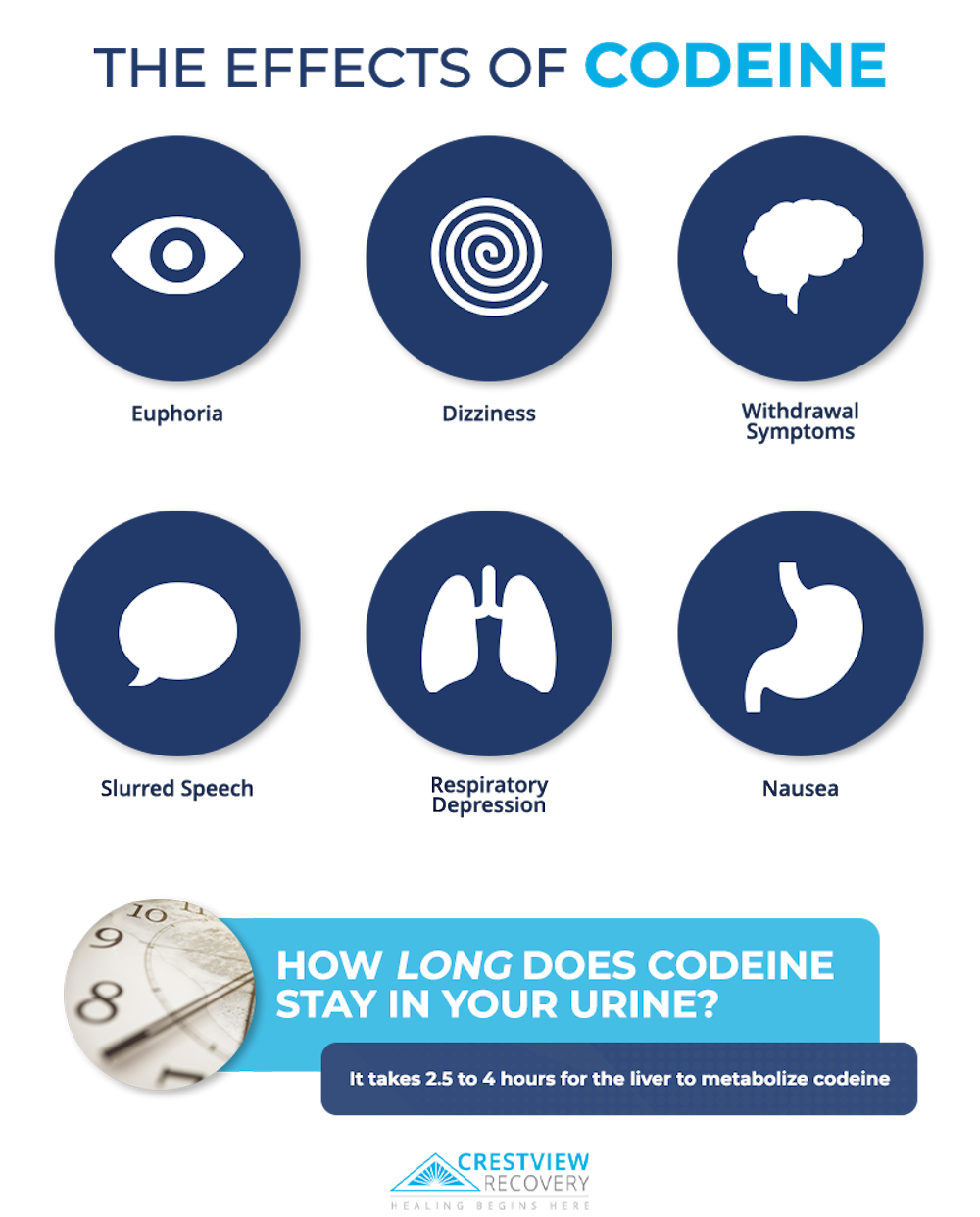Codeine is prescribed to treat mild to moderate pain relief. Knowing how long codeine stays in your urine is helpful information. This opiate medication works well when taken as prescribed but comes with risks. When misused, codeine’s side effects include possible overdose if too much remains in your system for too long. Seek help from a drug rehab center if you are experiencing codeine withdrawal symptoms.
Need to know more about codeine addiction treatment? Call our team at Crestview Recovery today.
What Is Codeine?
Codeine is a type of prescription pain medication that is used to treat mild to moderate types of pain. Codeine comes in tablet form and is the main ingredient in prescription-strength and over-the-counter cough suppressants. Tylenol 3, is a combination of codeine and acetaminophen.
Codeine is an opiate (also known as a called a narcotic). Other opiates include fentanyl, oxycodone, heroin, and morphine. The effects of codeine include:
- Euphoria
- Apathy
- Drowsiness
- Relaxation
Codeine Effects and Abuse

Codeine use typically starts out innocently when a person receives a prescription for a codeine-based cough syrup. Because codeine is less regulated than some other opioids, it is easier to obtain. Some signs and side effects of codeine abuse include:
- Euphoria: Individuals abusing codeine may experience intense feelings of euphoria, which can be pleasurable and lead to continued use.
- Sedation: Codeine is a central nervous system depressant, so excessive use can result in pronounced sedation, drowsiness, and sleepiness.
- Dizziness: Users may feel lightheaded, unsteady, or dizzy, which can affect coordination and balance.
- Slurred Speech: Codeine abuse can cause slurred or slow speech, making it difficult for individuals to communicate clearly.
- Constipation: Opioids like codeine often lead to constipation as they slow down the digestive system.
- Nausea and Vomiting: Some users may experience nausea, which can sometimes lead to vomiting.
- Itchiness: Codeine can cause itching or a rash, known as pruritus, as a side effect.
- Pinpoint Pupils: Opioid use, including codeine, can cause the pupils of the eyes to constrict and become very small.
- Respiratory Depression: In severe cases of codeine abuse, users may experience slowed breathing, which can be life-threatening.
- Increased Tolerance: Over time, individuals may require higher doses of codeine to achieve the desired effects due to increased tolerance.
- Withdrawal Symptoms: When not using codeine, individuals may experience withdrawal symptoms like anxiety, restlessness, muscle aches, and insomnia.
If you’re experiencing these symptoms Crestview can help! We offer painkiller rehab in Portland that addresses codeine misuse.
How the Body Processes Codeine
Upon ingestion, it takes 2.5 to 4 hours for the liver to metabolize codeine. This process is called “half-life,” and it describes how long it takes your body to process the drug. Your blood’s plasma processes half of what you ingest during those hours.
This length of time is relatively quick for codeine. Close to 90% of the substance gets eliminated in your urine via the kidneys within the first 24 hours. Yet, traces of codeine may still be in your system after that time passes. Whatever is left may show up in a drug test.
How Long Does Codeine Stay in Your Urine?
As previously mentioned, it does not take long for the body to eliminate codeine. Therefore, the question of “how long does codeine stay in your urine” is easy to answer with this understanding. Some of the substances can stay in your urine for up to two days.
Codeine is detectable within several hours after ingestion. It takes an extremely large dosage for a urine test to detect codeine after 24 hours.
Variables That Impact Detection
Other factors besides ingestion determine how long codeine stays in your urine. For example, actual time varies from one person to the next. Likewise, a variety of factors influence the timeframe that codeine remains in your system.
Some of these variables include:
- Age and weight
- Metabolism rate
- Frequency of using codeine
- Hydration level
- Dosage amount
- Presence of health conditions
- Active or inactive lifestyle
Codeine is relatively safe when taken as prescribed to treat minor pain. This same drug becomes addictive and dangerous at high doses. It depresses the central nervous system and can make you feel drowsy, relaxed, and euphoric. Codeine can also slow your heart rate.
Finding out how codeine stays in your urine is not always easy if you become addicted. Detecting an addiction can be difficult since you start taking it under medical supervision. Compulsive usage and a preoccupation with getting more of the drug are sure signs.
Get Treatment for Codeine Addiction Today
Crestview Recovery can help you or a loved one who suffers from an addiction to codeine. Our rehab center in Portland, Oregon, offers a substance use treatment program that can turn your life around.
We offer many programs and services to support your struggle to stop using a drug that was supposed to help. Our facility provides treatment in different formats such as:
Partial Hospitalization Program
A partial hospitalization program for codeine addiction is a structured program that provides support and treatment services to individuals who are struggling with a codeine addiction. This type of program typically involves group therapy sessions, individual counseling, medical monitoring, and other supportive services. Some programs also offer social activities or educational opportunities to help participants learn healthy coping skills and build a strong support system.
Intensive Outpatient Program
This is a type of treatment that focuses on helping people overcome their addictions to this powerful opioid pain medication by providing them with comprehensive support and care. Intensive outpatient programs in Oregon typically involve a combination of group counseling, individual therapy sessions, and other evidence-based approaches to addiction recovery. They are designed to help patients make positive changes in their lives and learn healthier coping skills, so that they can enjoy a drug-free lifestyle in the long term. If you or someone you love is struggling with codeine addiction, an intensive outpatient program may be the right treatment option for you.
Aftercare
An aftercare rehab program is a set of resources and services that provide ongoing support to individuals who are recovering from an addiction to this opioid pain medication. These programs typically include regular meetings with a counselor or therapist, as well as access to educational resources about the risks and consequences associated with codeine abuse. Some aftercare programs may also include participation in peer support groups or alternative therapies, such as yoga or meditation.
Don’t Go It Alone — We Can Help
You don’t have to continue this battle with codeine addiction alone. Crestview Recovery is here to help you begin anew. Contact us today to learn more about how to start your recovery journey today.
































